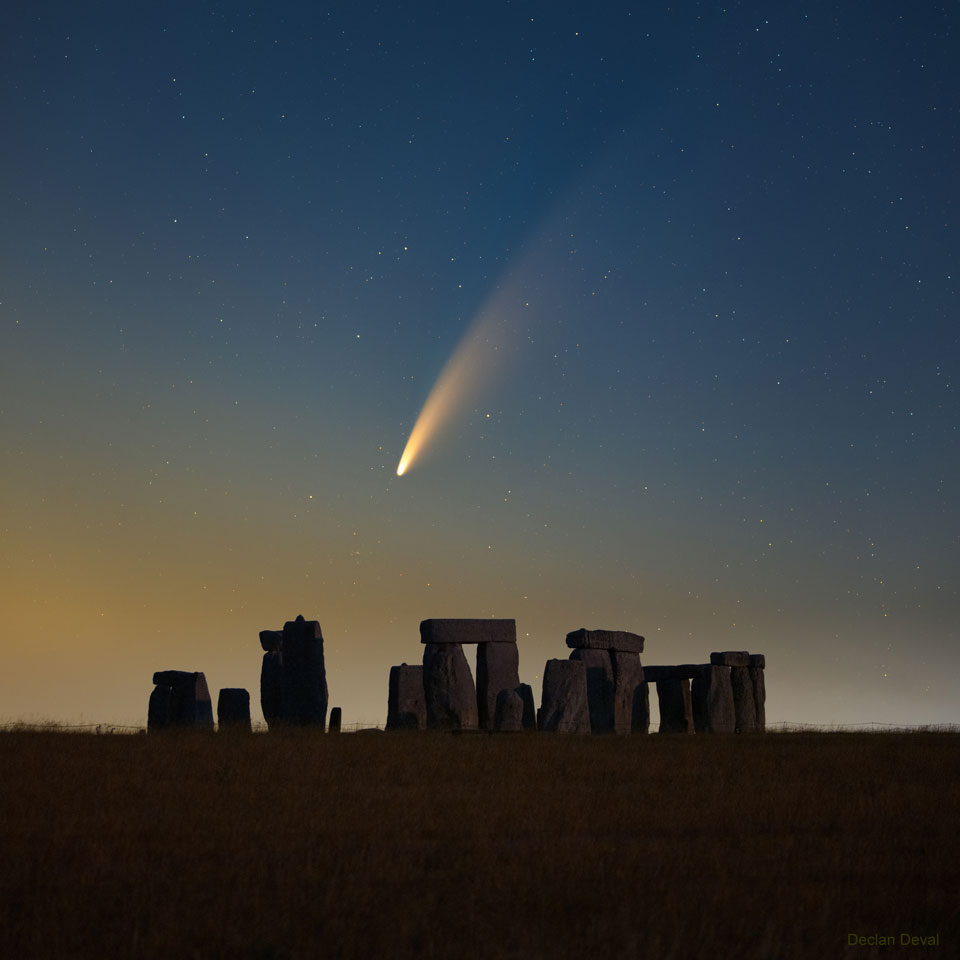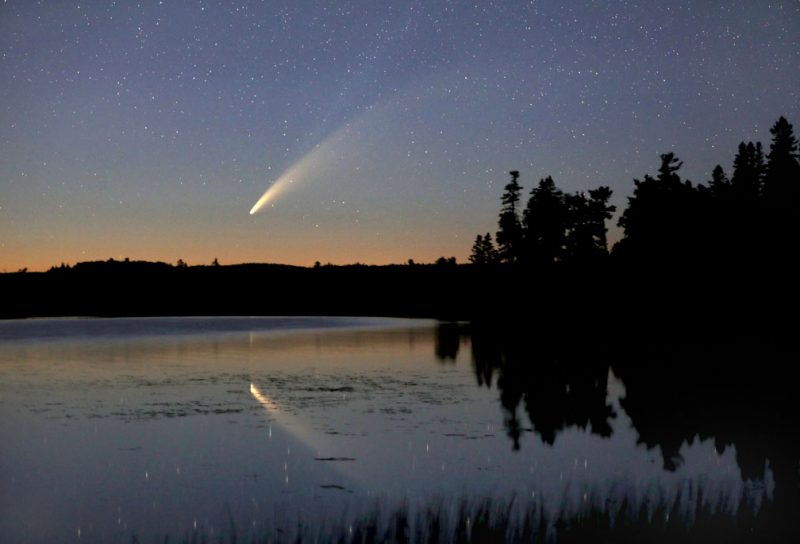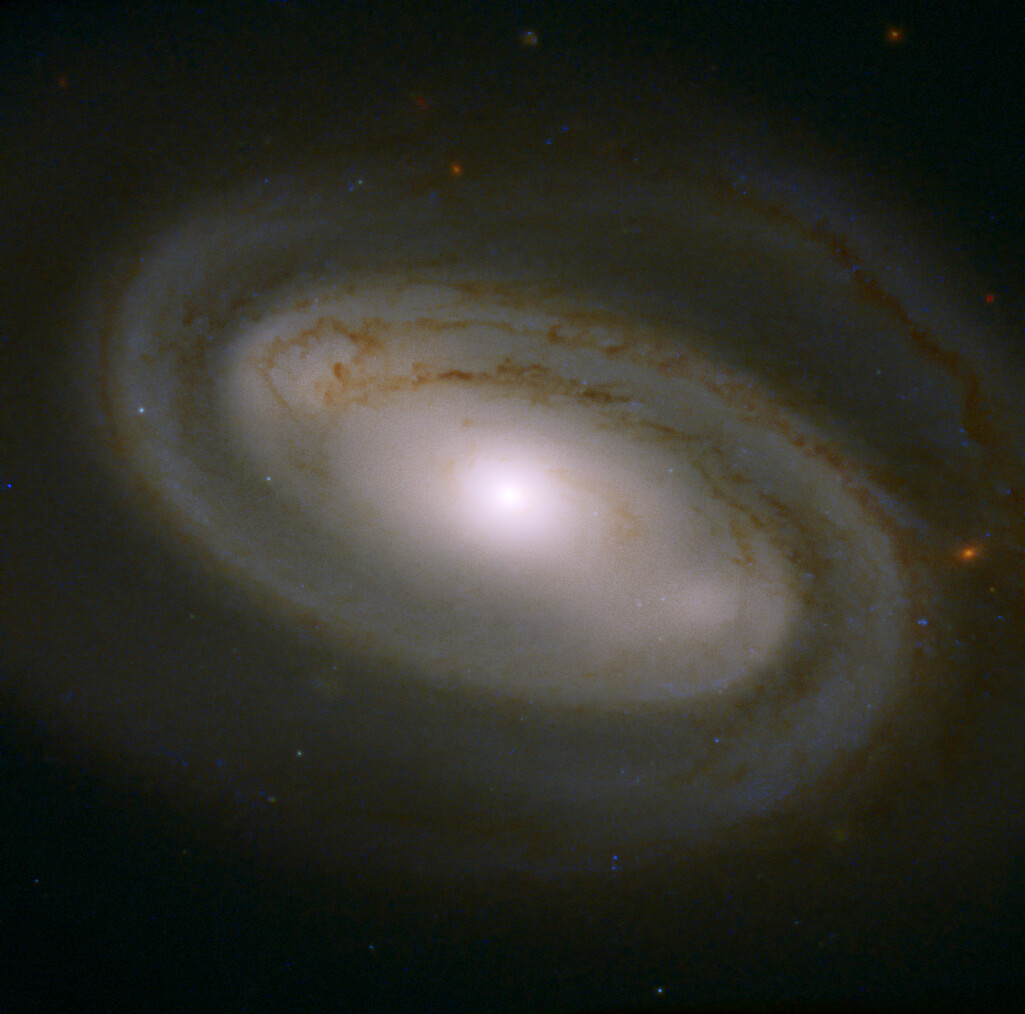Tonight — and likely the next few nights — should be a good chance. Go outside just at sunset and look to your northwest. The lower your horizon, the better. Binoculars may help, but if your sky is cloudless and dark, all you should need is your unaided eyes and patience. As the Sun sets, the sky will darken, and there will be an unusual faint streak pointing diagonally near the horizon. That is Comet NEOWISE. It is a 5-kilometer-wide evaporating dirty iceberg visiting from — and returning to — the outer Solar System. As the Earth turns, the comet will soon set, so you might want to take a picture. In the featured image, Comet C/2020 F3 (NEOWISE) was captured two mornings ago rising over Stonehenge in the UK. Discovered with the NASA satellite NEOWISE toward the end of March, Comet NEOWISE has surprised many by surviving its closest approach to the Sun, brightening dramatically, and developing impressive (blue) ion and (white) dust tails.

Angélique Kpasseloko Hinto Hounsinou Kandjo Manta Zogbin Kidjo, known as Angélique Kidjo (born July 14, 1960), is a Beninese singer-songwriter, actress, and activist of Nigerian descent who is noted for her diverse musical influences and creative music videos. In 2007, Time magazine called her “Africa’s premier diva”.
Her musical influences include the Afropop, Caribbean zouk, Congolese rumba, jazz, gospel, and Latin styles; as well as her childhood idols Bella Bellow, James Brown, Nina Simone, Aretha Franklin, Celia Cruz, Jimi Hendrix, Miriam Makeba and Carlos Santana. She has recorded George Gershwin’s “Summertime“, Ravel’s Boléro, Jimi Hendrix’s “Voodoo Child” and the Rolling Stones‘ “Gimme Shelter“, and has collaborated with Dave Matthews and the Dave Matthews Band, Kelly Price, Alicia Keys, Branford Marsalis, Ziggy Marley, Philip Glass, Peter Gabriel, Bono, Carlos Santana, John Legend, Herbie Hancock, Josh Groban, Dr John, the Kronos Quartet, Yemi Alade, Cassandra Wilson and Indonesia’s pop star Anggun. Kidjo’s hit songs include “Agolo”, “We We”, “Adouma”, “Wombo Lombo”, “Afirika”, “Batonga“, and her version of “Malaika“. Her album Logozo is ranked number 37 in the Greatest Dance Albums of All Time list compiled by Vice magazine’s Thump website.
Kidjo is fluent in five languages: Fon, French, Yorùbá, Gen (Mina), and English. She sings in all of them, and she also has her own personal language, which includes words that serve as song titles such as “Batonga”. “Malaika” is a song sung in the Swahili language. Kidjo often uses Benin’s traditional Zilin vocal technique and vocalese.
see full post...Louis “Sabu” Martinez (July 14, 1930 – January 13, 1979) was an American conguero and percussionist. A prominent player in the Cubopmovement, Martinez appeared on many important recordings and live performances during that period. Martinez also recorded several Latin jazzalbums, now recognized as classics of the genre.
Born in New York City, Martinez made his professional debut in 1941 aged 11. He replaced Chano Pozo in Dizzy Gillespie‘s orchestra in 1948, and began performing with Benny Goodman‘s Bebop Orchestra in 1949. Over the next 15 years, Martinez worked with Charlie Parker, Duke Ellington, Count Basie, J. J. Johnson, Horace Silver, Thelonious Monk, Charles Mingus, Mary Lou Williams, Lionel Hampton, Noro Morales, Marcelino Guerra, Esy Morales, the Lecuona Cuban Boys, Miguelito Valdés, Tito Rodríguez, and the Joe Loco Trio. He also worked with vocalists Tony Bennett, Sammy Davis, Jr., and Harry Belafonte.
Martinez first recorded with Art Blakey in 1953, and contributed to his Orgy in Rhythm and Holiday for Skins projects from 1957 to 1958. Martinez became a bandleader in 1957, recording his debut album, Palo Congo, for the Blue Note label. He followed it up with releases on Vik and Alegre Records. Martinez moved to Sweden in 1967 and recorded with the Francy Boland–Kenny Clarke big band, releasing two albums. Subsequently, he led the group Burnt Sugar, which was active into the mid 1970s. On January 13, 1979, he died in Sweden at the age of 48 from a gastric ulcer.
https://www.youtube.com/watch?v=gHm7jmF0MdY&list=PLCWC6NIPrik5gLuc1O63AWmjLM4rpi_82
see full post...Kenneth “Kenny” Napper (born July 14, 1933 in London) is an English jazz double-bassist.
Napper started out on piano as a child and picked up bass as a student at Guildhall School of Music. He entered the British military in the early 1950s, playing with Mary Lou Williams in 1953 during a leave period. After ending his term of duty, he played with Jack Parnell, Malcolm Mitchell, Vic Ash, and Cab Calloway. He was the house bassist at Ronnie Scott’s Jazz Club for several years and played with many British and American jazz musicians in the late 1950s and early 1960s, including Alan Clare, Ronnie Scott, Stan Tracey, Tubby Hayes, Tony Kinsey, Tony Crombie, Jimmy Deuchar, John Dankworth, Pat Smythe, Phil Seamen, Zoot Sims, Carmen McRae, and Paul Gonsalves. Later in the 1960s he worked with Ted Heath, Tony Coe, John Picard, and Barney Kessel, as well as with Gonsalves, Tracey, and Dankworth. In 1970 he played with Stephane Grappelli and moved to Germany, playing with Kurt Edelhagen from 1970 to 1972. While in Germany he focused more on composition and arrangement; later in the decade he moved to the Netherlands, where he arranged for radio ensembles.
see full post...Alan Dawson (July 14, 1929 – February 23, 1996) was a respected jazz drummer and widely influential percussion teacher based in Boston.
He was born in Marietta, Pennsylvania and raised in Roxbury, Massachusetts. Serving in the Army for Korean War duty, Dawson played with the Army Dance Band while stationed at Fort Dix from 1951–1953. During his tenure, Alan explored the post-bop era by performing with pianist Sabby Lewis. After being released from the Army, Alan toured Europe with Lionel Hampton.
Dawson is best remembered as an early teacher of Tony Williams, and Sawyer Brown drummer, Joseph Smyth. Other former students include: Terri Lyne Carrington, Julian Vaughn, Vinnie Colaiuta, Steve Smith, Kenwood Dennard, Gerry Hemingway, Jeff Sipe, Billy Kilson, and many others. He began teaching at Berklee College of Music in 1957. Dawson suffered a ruptured disc in 1975 which led to him halting his touring schedule, to leave Berklee and limit his teaching to his home in Lexington, Massachusetts.
His teaching style emphasized the music as a whole rather than concentrate on percussion alone. He stressed the importance of learning the melody and structure of the tune to better fulfill the role of accompaniment. For this purpose, he had students play over standards while also singing the melody out loud. He constantly strived for balance between musical ideas and strict technique. He was big on rudiments and wrote extensive exercises intended to be practiced with brushes. He believed using brushes with his “Rudimental Ritual” would reduce stick rebound allowing the sense of “picking up” the sticks. While teaching, Alan also maintained a prolific performing and recording career.
Dawson was the house drummer for Lennie’s on the Turnpike in Peabody, Massachusetts from 1963 through to 1970. This gig allowed him to perform with a diverse group of jazz artists. Around this time, Dawson was Boston’s premier jazz drummer for local acts as well as bigger name touring artists.
Throughout the 1960s Dawson recorded almost exclusively with saxophonist Booker Ervin on Prestige Records. In 1968 Dawson replaced Joe Morello in the Dave Brubeck Quartet and continued until 1972. His performance credits also included stints with Bill Evans, Sonny Rollins, Jaki Byard, Booker Ervin, Sonny Stitt, Dexter Gordon, Lee Konitz, Quincy Jones, Charles Mingus, Tal Farlowand many other top jazz artists.
see full post...https://www.youtube.com/watch?v=3irmBv8h4Tw
see full post...A wonderful binocular comet has been gracing our early morning skies, and now it’s visible in the evening as well, with optical aid, for latitudes like those in the northern U.S. and Canada. The comet is called C/2020 F3 (NEOWISE). This image is from Bob King – aka AstroBob – in Duluth, Minnesota. He wrote: “My first view of Comet NEOWISE at dusk instead of dawn from a lake near Duluth on July 11. Comets and water naturally go together as they’re thought responsible in part for delivering water to the early Earth.
C/2020 F3 (NEOWISE), or Comet NEOWISE, is a retrograde comet with a near-parabolic orbit discovered on March 27, 2020, by astronomers using the NEOWISE space telescope. By July 2020 it was bright enough to be visible to the naked eye. For observers in the northern hemisphere, the comet appears low on the northern horizon, below Capella. In the second half of July 2020 it will appear to pass through the constellation of Ursa Major, below the asterism of The Plough (Big Dipper).

James Roger McGuinn /məˈɡwɪn/ (born James Joseph McGuinn III; July 13, 1942) is an American musician. He is best known for being the frontman and leader of the Byrds. He was inducted into the Rock and Roll Hall of Fame for his work with the Byrds. McGuinn was born and raised in Chicago, Illinois, United States. His parents, James and Dorothy, were involved in journalism and public relations, and during his childhood, they had written a bestseller titled Parents Can’t Win. He attended the Latin School of Chicago. He became interested in music after hearing Elvis Presley‘s “Heartbreak Hotel“, and asked his parents to buy him a guitar. (During the early 1980s, he paid tribute to the song that encouraged him to play guitar by including “Heartbreak Hotel” in his autobiographical show). Around the same time, he was also influenced by country artists and/or groups such as Johnny Cash, Carl Perkins, Gene Vincent, and the Everly Brothers.
In 1957, he enrolled as a student at Chicago’s Old Town School of Folk Music, where he learned the five-string banjo and continued to improve his guitar skills. After graduation, McGuinn performed solo at various coffeehouses on the folk music circuit where he was hired as a sideman by the Limeliters, the Chad Mitchell Trio, and Judy Collins and other folk music artists in the same vein. He also played guitar and sang backup harmonies for Bobby Darin. Soon after, he relocated to the West Coast, eventually Los Angeles, where he eventually met the future members of the Byrds.
In 1962, after he ended his association with the Chad Mitchell Trio, McGuinn was hired by Darin to be a backup guitarist and harmony singer; at that approximate time, Darin wanted to add some folk roots to his repertoire because it was a burgeoning musical field. About a year and a half after McGuinn began to play guitar and sing with Darin, Darin became ill and retired from singing. Subsequently, Darin opened T.M. Music in New York City‘s Brill Building, hiring McGuinn as a songwriter for $35 a week.
During 1963, just one year before he co-founded the Byrds, McGuinn worked as a studio musician in New York, recording with Judy Collins and Simon & Garfunkel. At the same time, he was hearing about The Beatles (whose first American tour would commence in February 1964), and wondering how Beatlemania might affect folk music. By the time Doug Weston gave McGuinn a job at the Troubadour nightclub in Los Angeles, McGuinn had included Beatles’ songs in his act. He gave rock style treatments to traditional folk tunes and thereby caught the attention of another folkie Beatle fan, Gene Clark, who joined forces with McGuinn in July 1964. Together they formed the beginning of what was to become the Byrds.
see full post...Albert Ayler (/ˈaɪlər/; July 13, 1936 – November 25, 1970) was an American avant-garde jazz saxophonist, singer and composer. After early experience playing R&B and bebop, Ayler began recording music during the free jazz era of the 1960s. However, some critics argue that while Ayler’s style is undeniably original and unorthodox, it does not adhere to the generally accepted critical understanding of free jazz. In fact, Ayler’s style is difficult to categorize in any way, and it evoked incredibly strong and disparate reactions from critics and fans alike. His innovations have inspired subsequent jazz musicians.
His trio and quartet records of 1964, such as Spiritual Unity and The Hilversum Session, show him advancing the improvisational notions of John Coltrane and Ornette Coleman into abstract realms where whole timbre, and not just mainly harmony with melody, is the music’s backbone. His ecstatic music of 1965 and 1966, such as “Spirits Rejoice” and “Truth Is Marching In”, has been compared by critics to the sound of a brass band, and involved simple, march-like themes which alternated with wild group improvisations and were regarded as retrieving jazz’s pre-Louis Armstrongroots.
Born in Cleveland, Ohio, Ayler was first taught alto saxophone by his father Edward, who was a semiprofessional saxophonist and violinist. Edward and Albert played alto saxophone duets in church and often listened to jazz records together, including swing era jazz and then-new bop albums.Ayler’s upbringing in the church had a great impact on his life and music, and much of his music can be understood as an attempt to express his spirituality, including the aptly titled Spiritual Unity, and his album of spirituals, Goin’ Home, which features “meandering” solos that are meant to be treated as meditations on sacred texts, and at some points as “speaking in tongues” with his saxophone. Ayler’s experience in the church and exposure to swing jazz artists also impacted his sound: his wide vibrato was similar to that of gospel saxophonists, who sought a more vocal-like sound with their instruments, and to that of brass players in New Orleans swing bands. Ayler disappeared on November 5, 1970, and he was found dead in New York City’s East River on November 25, a presumed suicide. For some time afterwards, rumors circulated that Ayler had been murdered, with a long-standing urban legend that the Mafia had tied him to a jukebox.
see full post...Peter Michael Escovedo (born July 13, 1935 in Pittsburg, California) is a Mexican-American percussionist.
With his two brothers, Pete formed Escovedo Bros Latin Jazz Sextet, before Carlos Santana hired Pete and Coke Escovedo for his group. He led the 14–24 piece Latin big band Azteca. His daughter is singer-percussionist Sheila E..
see full post...Leroy Vinnegar (July 13, 1928 – August 3, 1999) was an American jazz bassist. Born in Indianapolis, Indiana, United States, the self-taught Vinnegar established his reputation in Los Angeles, California, during the 1950s and 1960s. His trademark was the rhythmic “walking” bass line, a steady series of ascending or descending notes, and it brought him the nickname “The Walker”. Besides his jazz work, he also appeared on a number of soundtracks and pop albums, notably Van Morrison‘s 1972 album, Saint Dominic’s Preview.
He recorded extensively as both a leader and sideman. He came to public attention in the 1950s as a result of recording with Lee Konitz, André Previn, Stan Getz, Shorty Rogers, Chet Baker, Shelly Manne, Joe Castro and Serge Chaloff.
He played bass on Previn and Manne’s My Fair Lady album, one of the most successful jazz records ever produced. He also performed on another of jazz’s biggest hit albums, Eddie Harris and Les McCann‘s Swiss Movement, released in 1969. Vinnegar also performed at the Lighthouse in Hermosa Beach, California, and Diggers in East Los Angeles in the late 1950s, with drummer and pianist Don Joham along with other musicians. He moved to Portland, Oregon in 1986. In 1995, the Oregon State Legislature honored him by proclaiming May 1 Leroy Vinnegar Day.
Vinnegar died of a heart attack, at the age of 71, on August 3, 1999, in a hospital in Portland
see full post...https://www.youtube.com/watch?v=S415KvTF9fw
see full post...Far away in the Ursa Major constellation is a swirling galaxy that would not look out of place on a coffee made by a starry-eyed barista. NGC 3895 is a barred spiral galaxy that was first spotted by William Herschel in 1790 and was later observed by the NASA/ESA Hubble Space Telescope.
Hubble’s orbit high above the Earth’s distorting atmosphere allows astronomers to make the very high resolution observations that are essential to opening new windows on planets, stars and galaxies — such as this beautiful view of NGC 3895. The telescope is positioned approximately 570 km above the ground, where it whirls around Earth at 28 000 kilometres per hour and takes 96 minutes to complete one orbit.

Christine Anne Perfect (born 12 July 1943), known professionally as Christine McVie following her marriage to John McVie, is an English singer, songwriter and keyboardist, best known as one of the three lead vocalists and the keyboardist of Fleetwood Mac. She joined the band in 1970. She has also released three solo albums. McVie is known for her contralto vocals and her direct but poignant lyrics, which concentrated on love and relationships. AllMusic describes her as an “Unabashedly easy-on-the-ears singer/songwriter, and the prime mover behind some of Fleetwood Mac’s biggest hits.” Eight of her songs appeared on Fleetwood Mac’s 1988 Greatest Hits album.
In 1998 McVie was inducted into the Rock and Roll Hall of Fame as a member of Fleetwood Mac and received the Brit Award for Outstanding Contribution to Music. The same year, after almost 30 years with the band, she opted to leave and lived in semi-retirement for nearly 15 years. McVie released one solo album in 2004. In September 2013, McVie appeared on stage with Fleetwood Mac at London’s O2 Arena. She rejoined the band in October 2014, ready for Fleetwood Mac’s On with the Show tour.
In 2014 she received the Ivor Novello Award for Lifetime Achievement from the British Academy of Songwriters, Composers and Authors.
see full post...